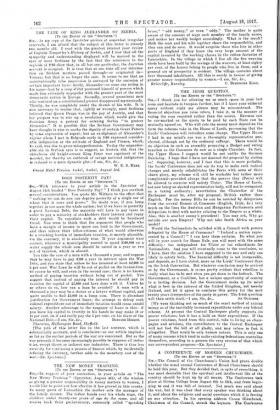THE IRISH QUESTION.
[To TM EDITOR or v. "Seec-rsvoa.") Ste,—I thank you for allowing me so much space in your last issue and hesitate to trespass further, but if I leave your editorial query without reply my silence may be misconstrued. The financial objection you raise refers, 1 take it, to the manner of voting the sum required rather than the source. Revenue can be ear-marked or the quota to be paid by each State can be mutually agreed on. Who will vote the money must depend on the form the reforms take in the House of Lords, presuming that the Lords' Conference will introduce some change. The Upper House I bad in my mind's eye was a thoroughly representative one, elected, although not by the ordinary suffrage. There would be no objection to such an assembly preparing a Budget and voting taxation as the Commons do now ns a single Chamber. In fact, the Upper House I suggest would be not unlike the German Reichstag. I hope that I have not damned the proposal by stating so! Supposing, however, and I fear that this is more probable, the Lords' Conference does not sae its way to make such radical changes and merely rehabilitates the Peers with some of their shorn glory, my scheme will still be workable but rather more complicated—provided always that the powers they (Peers) will be allowed to exercise will satisfy Ulster. The House of Lords, not now being an elected representative body, will not be recognized as a taxing authority; nevertheless the Chancellor of the Exchequer must be, after my proposal, British rather than English. For the money Bills ho can be assisted by delegations from the several Houses of. Commons (English, Irish, Ac.) very much on the lines the Austrian and Hungarian Parliaments send delegations to deal with matter relating to the Empire as a whole. Alas, this is another enemy's precedent! You may ask, Why go outside our own Empire? Why not take South Africa as your model ?
Would the Nationalists be satisfied with a Council with powers delegated by the House of Commons? " Ireland a nation repre- sented by a Council!" I can hear them exclaim. Do what you will in your search for Home Rule, you will meet with the some difficulty too independent for Ulster or to subordinate for Nationalists. And you will eventually come to the conclusion, as I have, that the solution I have suggested is the one and only ono likely to satisfy both. The financial difficulty is not insuperable, and depends, as I have stated, more on the Lards Conference than on the Irish Convention. But whatever conclusion may be arrived at by the Government, it seems pretty evident that rebellion is really what has to be met when you get down to the bedrock. The Government, as a Coalition, has a unique opportunity of coming to a lasting decision. Let the Government make up its mind what is best in the interest of the United Kingdom, not merely Ireland, and let it agree to continue this policy for the next twenty years irrespective of the party in power. The Irish question will then settle itself.—I am, Sir, Ac., AN °LTSSDM.
[We were thinking not no much of the exact method of raising money as of the inevitably increased expenditure under any federal. scheme. At present the Central Exchequer gladly supports its poorer relations; but it has a hold on their expenditure. If the poorer relations, freed from this eontrol, take to living on cham- pagne and ortolan, the contributors to the Central Exchequer will not foot the bill at all gladly, and may refuse to foot it altogether. That would be only human nature. This is only one of many reasons which tend to make existing federations centralize themselves, according to a process the very reverse of that which our correspondent proposes.—En. Spectator.]


























 Previous page
Previous page